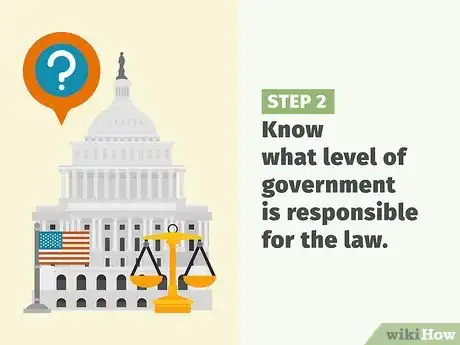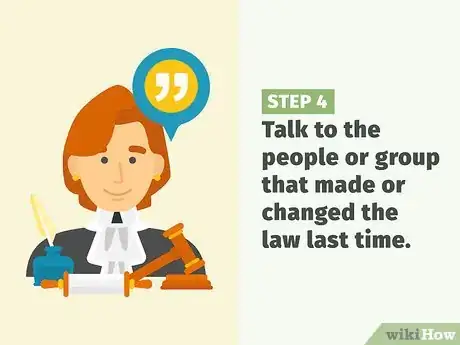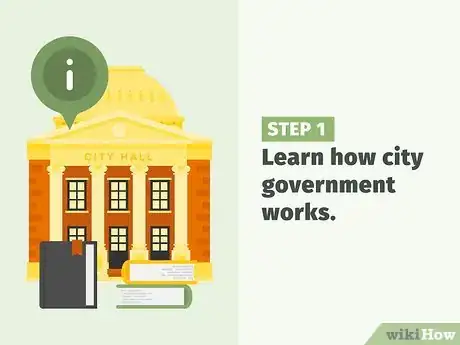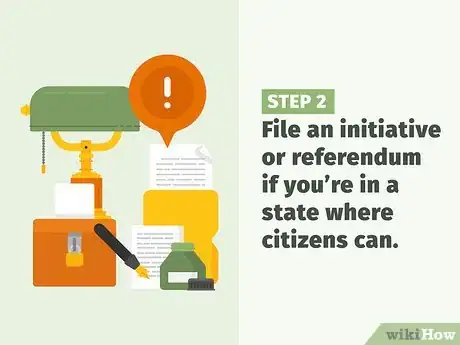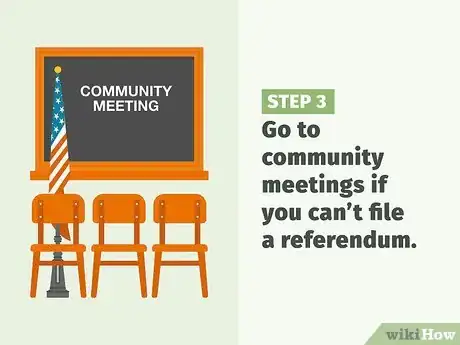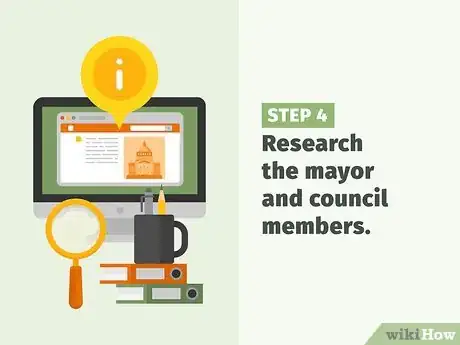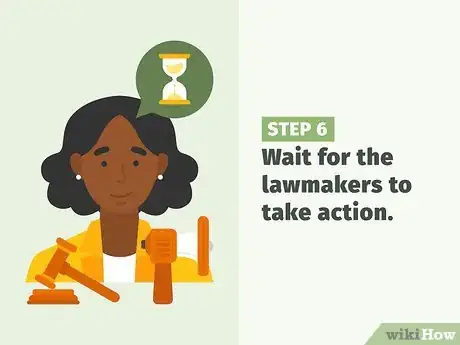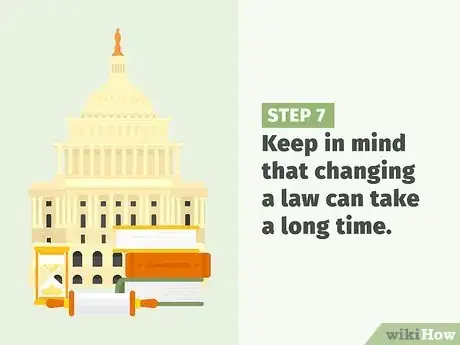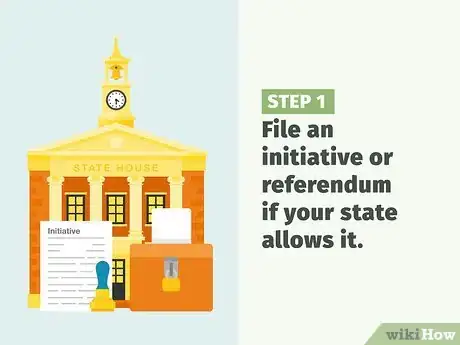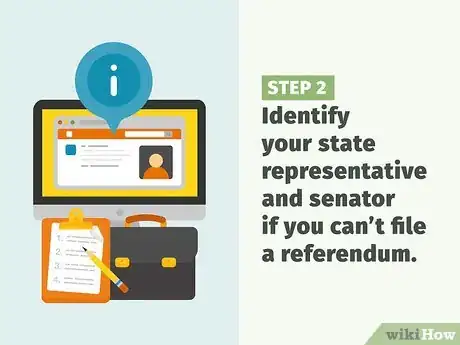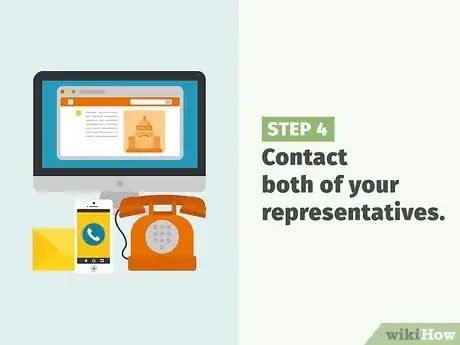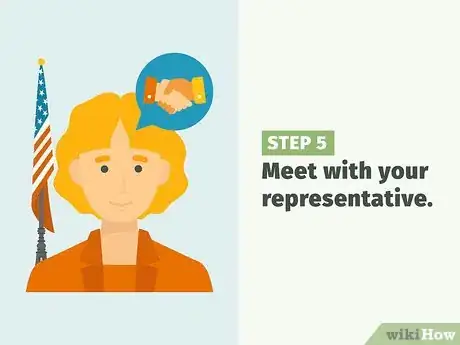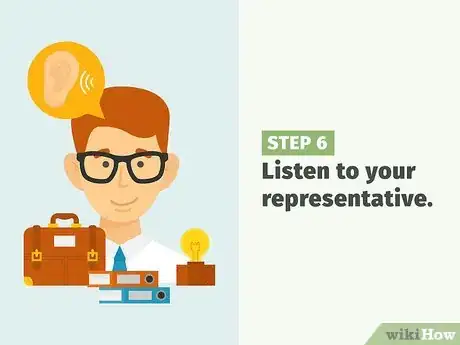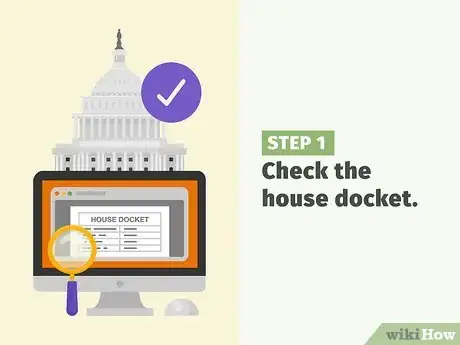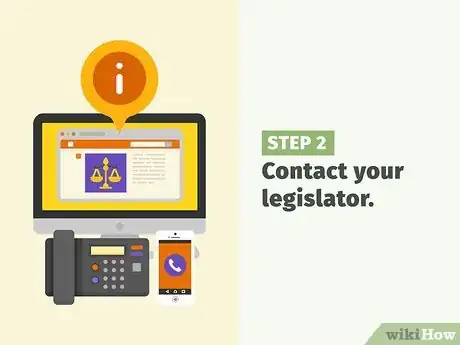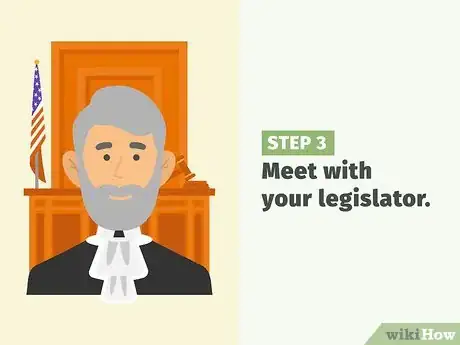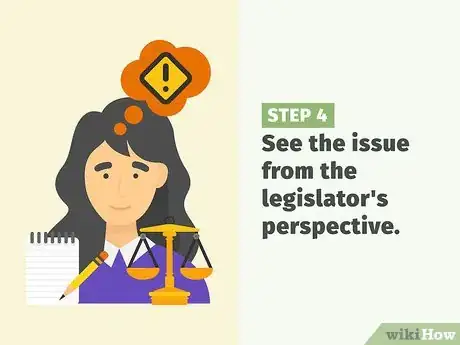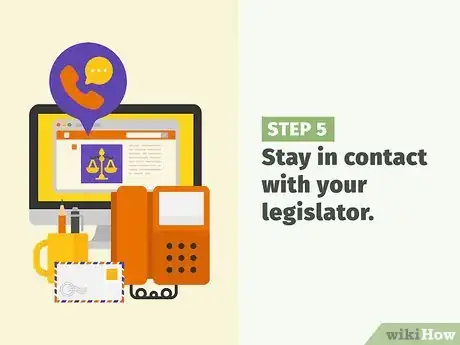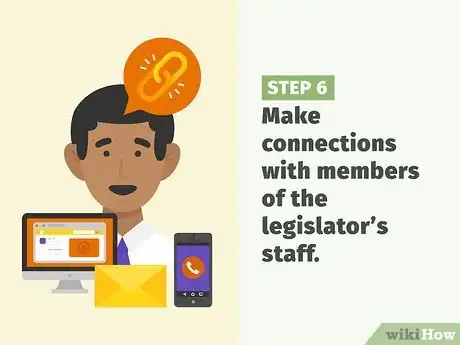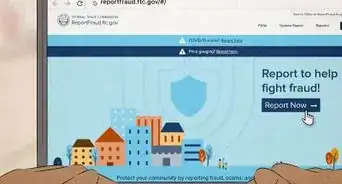wikiHow is a “wiki,” similar to Wikipedia, which means that many of our articles are co-written by multiple authors. To create this article, 49 people, some anonymous, worked to edit and improve it over time.
There are 17 references cited in this article, which can be found at the bottom of the page.
wikiHow marks an article as reader-approved once it receives enough positive feedback. In this case, several readers have written to tell us that this article was helpful to them, earning it our reader-approved status.
This article has been viewed 359,458 times.
Learn more...
To change a law, start by doing some research, finding the right level of government to approach, and looking into pending legislation. You might be able to write a draft of the law yourself, or you might need the support of your state or national legislator. It’s a lot easier to change local or state law than on the federal level, but there are possibilities for taking action at any level.
Steps
Finding your Issue
-
1Discover an issue that you are passionate about. It can be small -- trying to get people to clean up after their animals, for example -- or large -- trying to eliminate the sales tax on groceries in your state. Keep in mind that the smaller the issue, the better chance you have at making a difference. Local government necessarily includes fewer people, and because you are one of those people, your voice can make a difference in a way that it can’t among the millions on a state or national level.[1]
-
2Know what level of government is responsible for the law. Is it a national law? Then you might want to enlist the help of a Senator or Congressman. Is it a state law? Then your state house representative or a state senator is the person to see. Finally, if the law is a county or town ordinance seek out the local councillor, supervisor, mayor, or county executive.Advertisement
-
3Read the laws governing your issue. How old is it? Which person or group was responsible for writing it or changing it last time? It is important to know the history of the law so you have a better idea about how to change it. Knowing how it was made or changed before tells you who needs to be involved this time. If it was a vote by the city council before, chances are it will be changed by a vote by the city council again.
-
4Talk to the people or group that made or changed the law last time. Ask them about the feasibility of your idea.
- Can they change or repeal it in the same way? If not, what will be different this time?
- If it was a ballot measure (this is only true for some states), ask how to get your changes on the ballot again. You’ll need to know when to file your measure and how many signatures (often 1,000+) it will take to get it back to the voters.[2]
Looking for Local Solutions
-
1Learn how city government works. Towns and cities have different governing structures, so if you’re working on changing a local law, figure out how yours works. Most have a mayor and some kind of city council. Some also have other positions within the city government, including city managers and commissioners. Some states allow you to file local or state referendums as a citizen, but most states do not. If you are in a state that does not, you need to get the city council or mayor to support your idea and bring it to a vote.[3]
-
2File an initiative or referendum if you’re in a state where citizens can. Check to see you your state is one of them. In these states, you can file your intention to have your law on the ballot, then gather signatures, and finally file the petition with the signatures with the law. Then it will be put on the ballot. In most states, it’s not quite this easy.[4]
-
3Go to community meetings if you can’t file a referendum. This is a way for you to bring up your issue to local lawmakers. Check your city to see when there are meetings for constituents to bring up issues. You usually have a limited time to speak, so be prepared and be professional. You might have to go to many meetings before people begin to take you seriously, but this is an important step.
-
4Research the mayor and council members. Look at their websites. See what kinds of laws they have promoted in the past, and if yours might fit in. If you are going to change a local law, you need support from someone in the city government. If you don’t want to approach the mayor directly, choose the council member from your district or one you think will be sympathetic to your cause.[5]
-
5Meet with your chosen lawmaker. Tell them about your pattern of attending community meetings. Lay out your ideas for a law change. Bring copies of your proposed changes to share with the lawmaker. Ask their opinion on the feasibility of your goals. Listen to their suggestions. If they say that they need a petition with signatures from citizens showing support for your idea (probably at least 500 signatures), that’s your next step. Or they might like it just as it is and say that they will take it to the rest of the council.[6]
-
6Wait for the lawmakers to take action. Once you have presented the law and anything else they have asked for (like a petition), you have to wait and see what happens. The city council might choose to vote on your idea soon, or it might have to wait behind other outstanding business.
-
7Keep in mind that changing a law can take a long time. It also might be that your law comes up for a vote but fails. In that case, you will need to do more work in talking to the city council and mayor, trying to get it heard and voted on again, this time with adequate support.
-
8Try again. If your law doesn’t go anywhere the first time, talk to more constituents, make allies, and do the process again. This time, think about getting the media involved, having meetings specifically about the issue, and put up signs to help raise consciousness about the idea.[7]
Making Change at the State Level
-
1File an initiative or referendum if your state allows it. In this process, you file your intention to have the law on the ballot. You then collect 1,000+ signatures of registered state voters on the petition. Finally, you file the signatures along with the law. The attorney general reviews it all, writes the title of the measure, and it will be on the next state ballot.[8]
-
2Identify your state representative and senator if you can’t file a referendum. This is the first step if your state does not allow citizens to write ballot measures. These are the people in the capitol building in your state who are responsible for your specific area. They are the ones you need to make contact with if you are trying to change a state law.[9]
-
3Do your research. Look at their websites to see where they stand on the issues. Read articles from the newspaper (searchable easily online) to find out what kind of a lawmaker they have been and if you think they would be sympathetic to your idea. You will also want to know their political party and their record of voting -- these two items together can tell you a lot. You want to choose the one you think would be the better fit for your campaign -- approach him or her first.[10]
-
4Contact both of your representatives. Email is probably going to be the best way to do this. Their email address is going to be on their website -- all state representatives would have this. Explain to them that you are a constituent interested in trying to change or pass a law. Send them an example of the text of the law you think you want to create. Ask to meet with them about the feasibility of this law. Even if you think one of your representatives would be a better choice, if your first choice doesn’t respond go to your second representative.[11]
-
5Meet with your representative. This might mean a trip to your state capital. It also might be possible to meet with your representative while they are in-district -- representatives have offices in their home districts specifically to meet with constituents like you.[12]
- Dress professionally and lay out the reasons you want to change or create a new law.
- Come armed with arguments and facts.
-
6Listen to your representative. If he or she is unwilling to work with you, ask for suggestions about how you could proceed. He or she might direct you to another legislator, or to a group with similar concerns. Always be polite, even when your representative will not help you.
Creating the National Solution
-
1Check the house docket. See if there are any pending pieces of legislation that might accomplish the goal and are already in the legislative pipeline. If this is the case, you can then just lobby for your representative to vote a certain way on the law that is already being considered.[13]
-
2Contact your legislator. This can be tricky. Anything you can do to try and make yourself stand out can help. Have you met the legislator before? What do you do in his or her constituent community?
- Call for an appointment. Keep calling -- it will often take a long time before anything will be available for you. Persistence can pay off.
- Write a clear and concise email about your proposed law. Make it personal -- talk about why you want this so badly. Be sure to include your address and phone number so the legislator can choose the best way to contact you.
- Donate to the legislator’s campaign. Many legislators are more willing to make time for people who have donated money to them than other constituents.[14]
-
3Meet with your legislator. Realize that you need to be flexible, and that it might take a while to get a meeting. Be prepared to wait a month or so before an available appointment.[15]
- Show the legislator your proposed legislation.
- Be clear and professional. Make arguments that are not personal and would resonate with many of his or her constituents.
- Don’t take up too much of the legislator’s time. He or she is constantly being asked for things and often he has no idea about what the issue is about.
- Bring information to leave for him and an extra copy for a staffer.
-
4See the issue from the legislator's perspective. Sometimes his or her goals are different from your own. Even though you are a constituent, you and your representative might be on opposite ends of the ideological spectrum. When lobbying your legislator to change the law, you have to see how it matches the legislator's goals, values and constituents. If he or she ran on a platform of support for the Second Amendment, gun control is probably not an issue that they are willing to pursue. It is always good after you have had the meeting to send a thank you letter and a reminder of what you talked about.[16]
- Write a short note with your name and address clearly stated.
- Tell the legislator that “it was wonderful to meet you and discuss X.”
- Remind them nicely that you will continue to contact them about the issue
-
5Stay in contact with your legislator. After the meeting, he or she will probably not be able to give you a clear answer on how your proposed law might happen. Don’t expect much movement quickly -- the federal government moves very slowly.[17]
- Keep emailing and writing in a polite way.
- Ask for suggestions of other ways to take action -- groups that might share your concerns that you could work with, for example.
-
6Make connections with members of the legislator’s staff.Since it’s difficult to be in contact with the individual legislator, try making contact with one of the staffers. It will be easier to keep in contact with him or her, they can lobby on your behalf to the legislator, and they might be able to offer good suggestions.[18]
-
7Don’t give up hope. Changing a national law is a long and difficult process. Even if you are successful, it will probably take years for the law to be voted upon, and then you still have a good chance of defeat.[19]
Community Q&A
-
QuestionHow do I change a law in a particular state?
 Community AnswerMake an appeal to the government (if you want a law to be made or amended) or to the state court (to challenge an existing law).
Community AnswerMake an appeal to the government (if you want a law to be made or amended) or to the state court (to challenge an existing law). -
QuestionWhich branch of government handles the law on medical release?
 Community AnswerThe legislative branch is responsible for debating and passing all laws. The executive branch is responsible for enforcement. The judicial branch is responsible for interpreting the law on a case by case basis. They each have a role to play in any specific legal issue.
Community AnswerThe legislative branch is responsible for debating and passing all laws. The executive branch is responsible for enforcement. The judicial branch is responsible for interpreting the law on a case by case basis. They each have a role to play in any specific legal issue. -
QuestionCan I petition for changing laws about sanctions or economic embargo if I am a foreigner and they affect my country?
 Community AnswerYou most certainly can. Just don't expect to succeed in actually changing the laws.
Community AnswerYou most certainly can. Just don't expect to succeed in actually changing the laws.
References
- ↑ http://www.democratichub.com/issues.aspx
- ↑ http://ballotpedia.org/Local_Ballot_Initiatives:_How_citizens_change_laws_with_clipboards,_conversations,_and_campaigns
- ↑ http://www.nlc.org/build-skills-and-networks/resources/cities-101/city-structures/forms-of-municipal-government
- ↑ http://sos.oregon.gov/elections/Pages/locallaw.aspx
- ↑ http://council.nyc.gov/html/home/home.shtml
- ↑ https://www.change.org/petition
- ↑ https://www.infopeople.org/civicrm/event/info?reset=1&id=386
- ↑ http://sos.oregon.gov/elections/Pages/locallaw.aspx
- ↑ http://openstates.org/find_your_legislator/
- ↑ https://www.govtrack.us/congress/votes
- ↑ http://www.asam.org/docs/default-source/advocacy/how-to-contact-your-state-legislators.pdf?sfvrsn=0
- ↑ http://www.healthyworkplacebill.org/takeaction/meetrep.php
- ↑ https://www.govtrack.us/congress/bills/
- ↑ http://www.npr.org/2014/03/26/294361018/how-to-meet-your-congressman
- ↑ https://info.cq.com/resources/how-to-meet-with-members-of-congress/
- ↑ http://www.ucsusa.org/action/meeting-with-legislators.html#.Vh510StU_IU
- ↑ http://www.npr.org/2014/03/26/294361018/how-to-meet-your-congressman
- ↑ http://www.congressfoundation.org/storage/documents/CMF_Pubs/cmf-face-to-face-with-congress.pdf
- ↑ https://www.naeyc.org/policy/federal/bill_law
About This Article
To change a law through the democratic process, start by identifying which level of government is responsible for the issue. For example, you'll want to contact your city's government if you want to encourage people to clean up after their pets. Alternatively, file an initiative or referendum to get your proposal on the ballot if your state allows it. You can do this by gathering signatures in support of your proposal before submitting them to the state for approval. If you can’t file an initiative, try attending a local community meeting to raise your issue. For tips on how to contact your Senator and how to visit your state capitol, read on!

